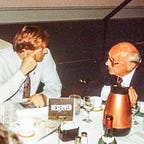The Myth of the Market
Margaret Thatcher once said: “There is no such thing as society.” What she meant was society is a collection of individuals not that the term “society” has no meaning. Society is a complex and intricate web of voluntary interaction, but not something you can touch or smell. Nor can you even see it. You can witness voluntary interactions but society is the accumulation of such interactions, not any specific one you may notice.
Thatcher was correct to say society does not exist in the way apples, people, or cars exist.
In precisely the same way it’s correct to say society does not exist. Markets and societies are very similar things. Markets are an intricate and complex web of voluntary economic interactions between people.
That is also a major component of what is called society. Felix Morley argued state and society are very different things. The state, he said, subjects whereas society associates. While the state subjugates the hallmark of society is voluntary interaction.
If society is a web of voluntary actions then markets are inherently social. Markets differ slightly in that the voluntary interactions are more of the nature of an exchange than an association. Even this difference is not as great as might appear on the surface. While exchanges can be of a monetary or economic nature there is more to markets than just the financial. Associations are also exchanges though they often are of a non-monetary nature but people do associate with others because they benefit from doing so.
Ours is a social species. We live with and need others. We are not free floating atoms unconnected to others. One of the great virtues of markets is through peaceful and voluntary exchange humans benefit one another.
One great development in human evolution was the division of labor. Individuals and groups ceased attempting to be self-sufficient and became specialists exchanging the fruits of their labors with others so all benefitted.
The social philosopher/economist Ludwig von Mises said the division of labor turns humanity into “the social animal of which Aristotle spoke.” He argued conflict in a society where division of labor is well developed is detrimental to all and helps decrease the likelihood of conflicts.
“Hostility between one animal or another, or between one savage or another, in no way alters the economic basis of their existence. The matter is quite different when a quarrel that has to be decided by an appeal to arms breaks out among the members of a community in which labor is divided. In such a society each individual has a specialized function; no one is any longer in a position to live independently, because all have need of one another’s aid and support… when a village divides into factions, with the smith on one side and the shoemaker on the other, one faction will have to suffer from want of shoes, and the other from want of tools or weapons.”
Markets promote harmony and cooperation in another way. The division of labor means we need the other members of society in order to prosper ourselves, but it also means each producer needs to consider the needs of others if he is to prosper. In his The Wealth of Nations Adam Smith, the first exponent of modern economics, made a similar point.
“In civilized society [man] stands at all times in need of the cooperation and assistance of great multitudes… man has almost constant occasion for the help of his brethren, and it is in vain for him to expect it from their benevolence only. He will be more likely to prevail if he can interest their self-love in his favor, and show them that it is for their own advantage to do for him what he requires of them.”
Smith explained how in a society with division of labor each person satisfies the wants and needs of others in order to exchange with them. Nobel prize winning economist F.A. Hayek put it this way: “The benefits I derive from freedom are thus largely the results of the uses of freedom by others.”
The purpose in the market is not the satisfaction of others but the satisfaction of self. But to satisfy self one must satisfy others. Whether or not traders wish to benefit others is immaterial, in depoliticized markets they will do so.
All that matters is whether they wish to benefit. If so they must find others willing traders who perceive benefits themselves in order to participate. The profit-seeking individual in a market with division of labor needs to benefit others in order to benefit himself.
When we realize the market does not exist in reality, but is merely a term to describe the entire process of free exchange between individuals, we see that just as the core of society is the individual, the core of markets is also the individual.
Sometimes when we use the construct of “market” to describe these interactions we forget people are involved. This ability to forget the human factor and instead discuss “the market” allows many to advocate policies that are inherently inhumane. Many people oppose “markets” in order to help “people” but forget markets are people.
It is much easier to subjugate others and impose our will when we pretend what we are doing is not being done to humans but done to social constructs such as “society” or the “market.” It is important for classical liberals to remind those with this totalitarian temperament of this human element, which they so easily forget.
Due to unforeseen circumstances income will drop dramatically making it harder to sustain this page. Your support to fund these columns is now critical, visit our page at Patreon to make a $10 pledge. Due to unforseen circumstances income will drop dramatically making it harder to sustain this page. If you wish to pledge another amount per month you can do so at this link — anything starting at $1 and up.
